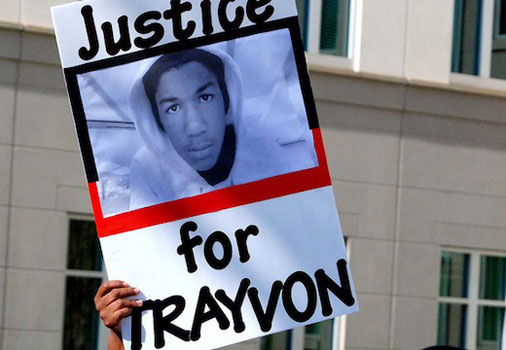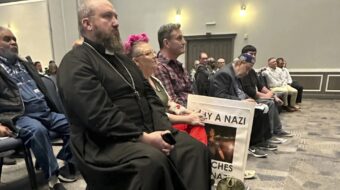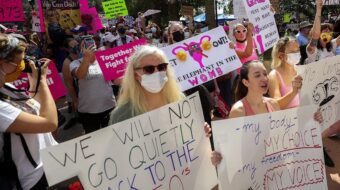
After the acquittal of Trayvon Martin’s admitted killer George Zimmerman, America found itself confronting the long-standing flaw in the democratic promise of “justice for all”: race and racism. While there is a spectrum of views on the case and the verdict, two contradictory trends have become apparent quickly. One is denial that race or racism played any part, and the other is the view that race and racism is central to the whole case. We, like millions of others, agree with the latter. To deny the role of racism is to deny reality staring us all in the face.
Racism in our country is many-sided and systemic. One could spend considerable ink discussing the numerous ways it led to the killing of Martin and the ensuing legal case. Suffice it to note that it took a monumental struggle just to bring charges against Zimmerman for killing of the unarmed African American youth.
But the multi-racial Justice for Trayvon movement – led by Trayvon’s incredibly courageous, dignified and loving parents – is becoming a cornerstone on which to build a far-reaching new civil rights movement. These next days are critical to getting the Department of Justice to act and uphold Trayvon Martin’s civil rights. You can sign petitions on the NAACP, American Federation of Teachers, ColorOfChange and MoveOn websites or host a neighborhood, town or city-wide vigil for justice. Building a massive 50th anniversary March on Washington this August could be a game-changer in the fight “to realize the dream.”
Voting rights, civil rights and dangerous laws like Florida’s so-called Stand Your Ground have to be among the issues that mobilize massive numbers for the 2014 mid-term elections. The National Rifle Association, oily billionaire Koch brothers, the American Legislative Exchange Council and their tea party, ultra-right ilk are counting on a low turnout. If they are successful in repressing and depressing the vote, getting Congress to reinstate the Voting Rights Act, recently gutted by the ultra-conservative Supreme Court ruling, will be a monumental task instead of an attainable one. The same for common sense gun laws on the state and federal level.
From district attorneys to state lawmakers, racism has to be addressed.
When a Black teenager is profiled as a criminal and then killed because someone like Zimmerman supposedly feared for his life, it brings up too many other similar cases. Emmett Till, Oscar Grant and Amadou Diallo come to mind. But one of the clearest examples of racism in practice is the case of Marissa Alexander of Jacksonville, Fla., who fired warning shots at her husband after she felt her life threatened. She got 20 years for defending herself. Alexander is Black. So much for the equal application of the Stand Your Ground law.
The modern day criminalization of Black Americans has its roots in the rise of the ultra-right, starting with the election of Ronald Reagan in 1980, and the implementation of anti-99-percent social and economic policies, including the so-called War on Drugs. It has helped to create a criminalization atmosphere for all of society. Need an abortion? You’re a criminal. On unemployment? You need to be drug-tested. Look like an immigrant? Show us your papers. In a union? Thug! Parasite!
As documented in Michelle Alexander’s “The New Jim Crow: Mass Incarceration in the Age of Colorblindness,” these policies have led to the mass incarceration 2 million working class people – mainly Black and Latino men.
This in turn has led to the justification of other reactionary policies that have severely crippled democratic rights and educational and economic opportunities. For example, “three strikes you’re out,” “stand your ground,” “stop and frisk” and racial profiling. Racism justifies decimating funding for public housing, education, food stamps and other vital programs that serve tens of millions, of all races. It justifies unequal treatment before the law, unequal education, unequal employment opportunities and unequal pay. In short, while millions are influenced by racism in their attitudes and beliefs, the bonds and barriers of racism serve ruling class interests, diametrically opposed to their own.
This could be an “aha” moment for millions, particularly white Americans, raising new awareness of the persistence of racism, why it exists, how it distorts and twists democracy for 99 percent of the population and how its systemic nature serves the interests of the 1 percent ruling elite. Racism, like war and violence, destroys communities and human decency. It has a physical and psychological toll on all – perpetrator, target, or bystander. It’s the most un-American of American-made systems.
In July 2008, then-AFL-CIO Secretary-Treasurer Richard Trumka gave a profound speech on labor, racism and the importance of electing Barack Obama president. Declaring, “there is no evil that has inflicted more pain and suffering than the evil of racism in our country,” Trumka said, “We have a special responsibility to fight this evil. Not by calling anyone racist, but by educating those who won’t vote for Barack Obama because he is Black.” These are lessons we can draw from today.
Photo: From a 2012 Sanford, Fla., protest (werthmedia).












Comments